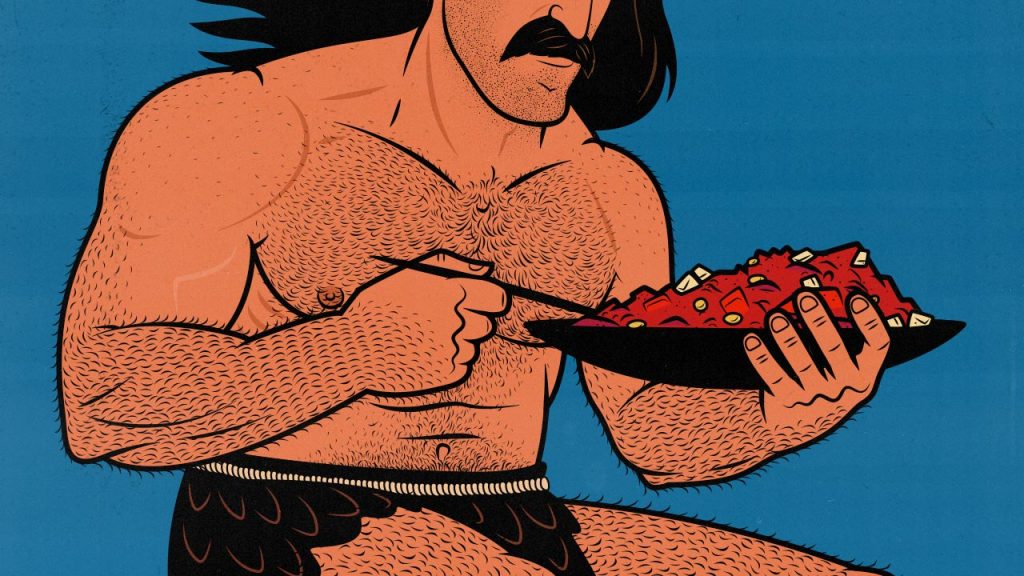
The Best Bulking Diet for Ectomorphs Isn’t a Diet at All
It can be hard to figure out what the best diet for ectomorphs is. When you search for the healthiest diets, you’ll find diets that are designed to help people lose weight. And that makes sense. After all, at least in the United States, the CDC estimates that only 1.9% of people are underweight. Wanting to gain weight is quite rare.
The reason the CDC cares about this stuff is because so many people are running into health problems from being overweight. As a result, most people need to adopt various diets to help them lose weight. This has become the standard recommendation for improving health: choose a diet that helps you lose weight.
In fact, the very term “dieting” implies that we should be restricting foods and calories to help us eat less. But what if we’re trying to gain weight? Do ectomorphs need an anti-diet?
Yes. We do.
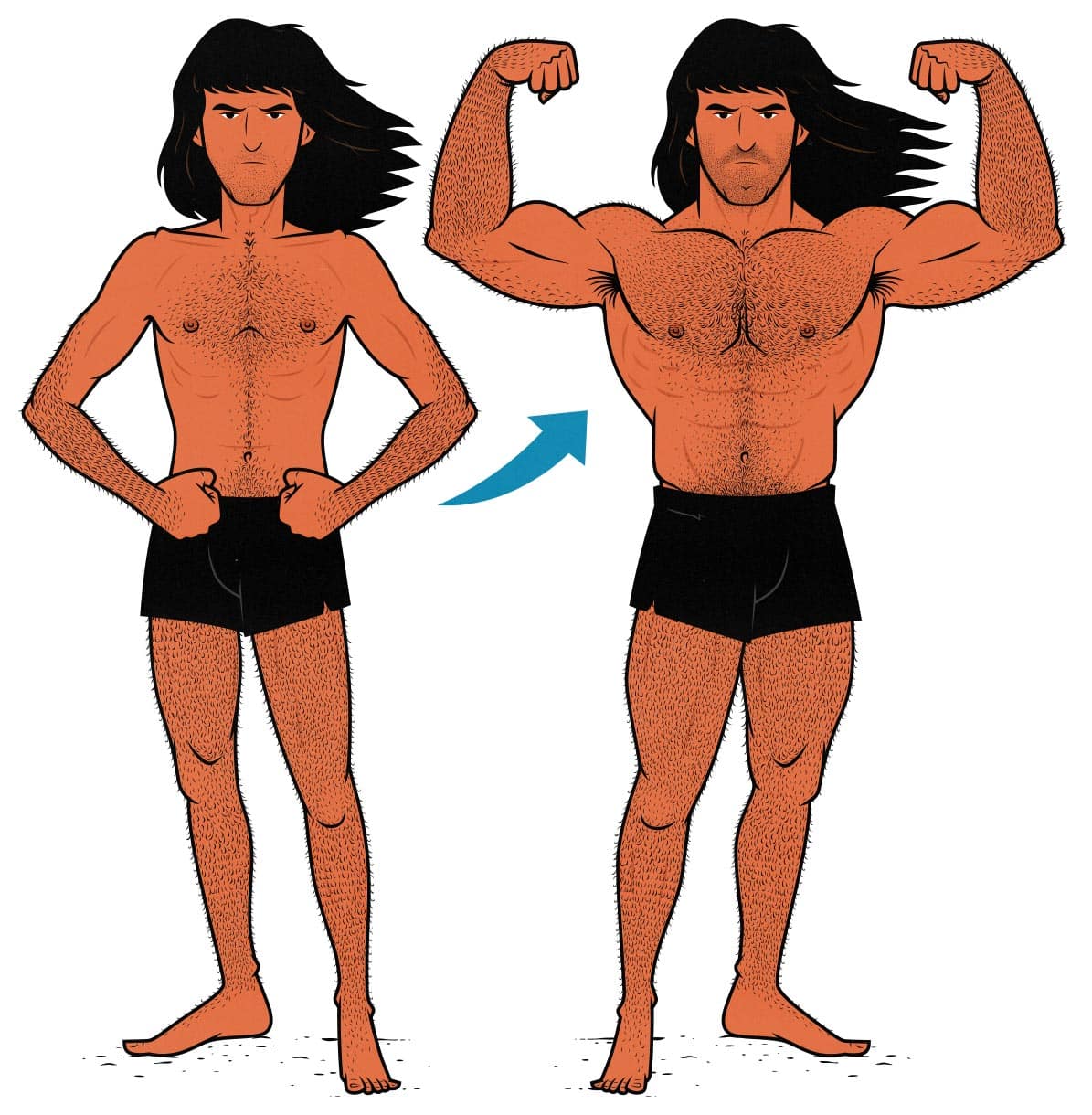
A Note on the Word “Ectomorph”
“Ectomorph” is a slang term that originated in old psychological pseudoscience. The idea was that people with thinner body types tended to be more anxious, introverted, and intellectual. Several decades later, the term was coopted by the fitness industry. The psychological aspect was dropped. It came to refer to someone with a narrower bone structure who has a propensity for thinness. That’s how we’re using the term here.
You could also call us “hardgainers” because we have a hard time gaining weight. That term has a bit more scientific credibility. Either way, though, these words are used colloquially. It’s just a way of referring to people who have a hard time eating enough calories to bulk up.
This is one of our older articles, originally published in 2012. ‘m editing it in 2023 to make it easier to read. I’m leaving the original message alone. In more recent articles, we’ve started saying “naturally thin” instead of “ectomorph.” The problem is, if we completely avoid the word, people searching for content for ectomorphs won’t find us. By using more precise terminology, we’d abandon our tribe.
An Obsession With Healthy Eating
I had coffee a few weeks back with a good friend of mine. I had just finished a couple of months of the Bony to Beastly program, and I’d put on 20 pounds since she last saw me. She was wowed by my progress and asked how I did it.
She said I looked healthy, but she worried I was headed down the road to obsession. She was concerned that I was developing an obsession with eating an overly “clean” diet. She’d struggled with an eating disorder herself, and she knew that clean eating often led to an unhealthy relationship with food.
She had a point. Most people struggle with eating too much junk food, but a substantial minority place too much emphasis on healthy eating. I’m sure you’ve seen them. These are the people who shun everyday foods in favour of exotic superfoods, trendy supplements, and fad diets.
The secret to becoming superhuman isn’t to eat superfoods, it’s to eat “Clark Kent” foods—everyday bulking foods that yield superhuman results.
Underweight Ectomorph to Dirty Bulker
I used to suffer from reverse anorexia, which, unfortunately, looks about the same as its opposite. In my desperation to gain weight, I was trying to eat as much as I possibly could, and yet, I still left strangers wondering if I had an eating disorder.
I was 6’2 and 130 pounds (BMI under 17) with a body that made runway models jealous. I come from a long line of extraordinarily skinny people, so I knew it had something to do with my genetics. My dad weighed 100 pounds in his early twenties. My mum’s nickname had been “lampshade.”
No one in my family is sporty or athletic. None of us gravitated toward sports or exercise. We’ve never been the best at eating, either. But we weren’t intentionally making ourselves thin—quite the opposite. This is an example of me having no idea what I was doing nutritionally, and quite obviously, it wasn’t working for me.
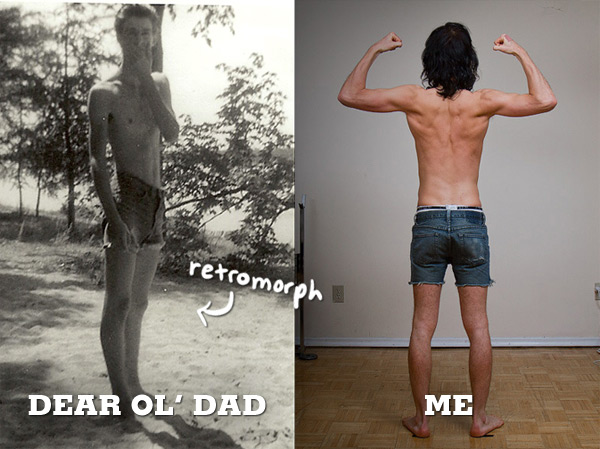
Now, 60 pounds of muscle heavier and with my “genetics” soundly defeated, I’ve been accused of something a little bit more flattering: orthorexia.
Orthorexia is when someone restricts themselves to eating only the very healthiest of foods. It’s perfectly fine to gravitate toward healthy foods. Eating a good diet is good. But orthorexia takes that to an unhealthy extreme. It’s an obsession.
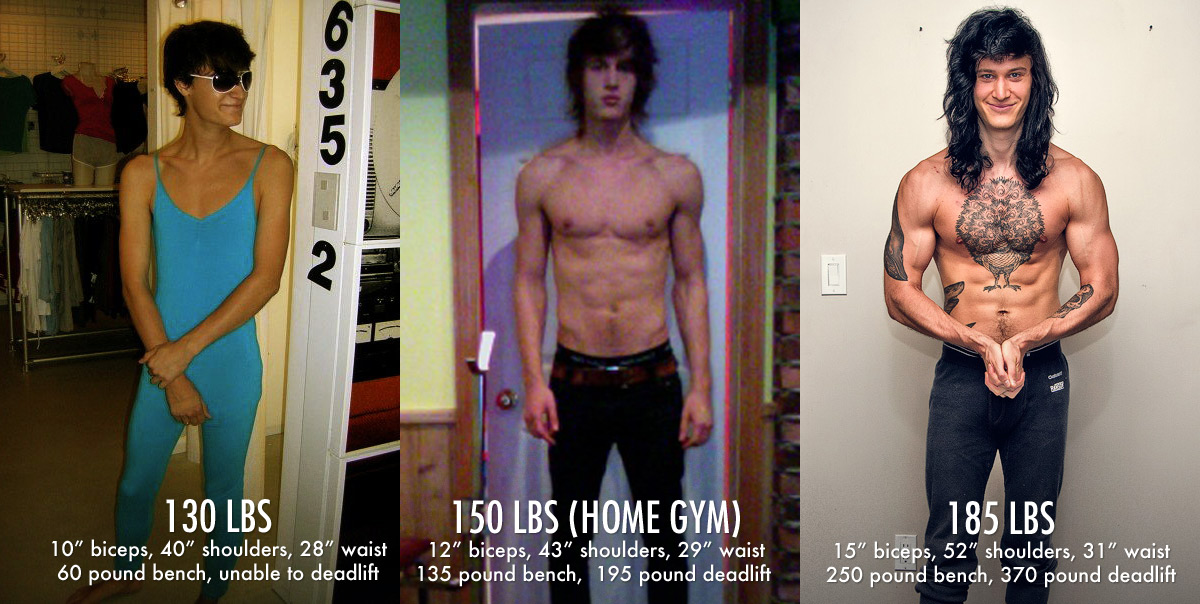
I wasn’t orthorexic. In fact, if you had to classify me as either a clean or dirty bulker, I’d probably fall more on the dirty side of things. But even so, that accusation raised an interesting question. Should ectomorphs loosen up their diets?
The Problem with Restrictive Diets
Restricting Foods Restricts Nutrients
Health-conscious people eating restrictive diets have the highest chance of suffering from nutrient deficiencies, even when comparing them against the general population. These nutrient deficiencies are common among top athletes and bodybuilders (study, study, study, study, study). The people who pay the most attention to their diets are suffering from it.
Part of the reason they run into deficiencies is simply because they’re consuming fewer calories. Eating fewer calories means that fewer nutrients are coming in overall, which makes it more likely that you won’t get enough of them (study). But that’s not the whole story.
The other problem is that eating a clean bodybuilding diet is kind of a weird way to eat. It’s usually based around just a few foods: skinless chicken breast, egg whites, lean cuts of steak, olive oil, fish oil, spinach, broccoli, sweet potatoes, brown rice, tuna, oats, protein powder and creatine.
If you’re cutting out dairy, grains, and fruits, you’re cutting out entire categories of food, missing out on entire classes of nutrients. You may be eating plenty of healthy foods, consuming a high quantity of nutrients. But if your diet lacks balance, it may fail to give you the breadth of nutrients you need.
Most cultures have found a way of meeting their nutritional needs, and over time these practices become cultural traditions. Mexicans who cut out corn, chocolate, and beans are knocking down pillars of their diets, setting themselves up for collapse. Northern European diets often rely on dairy and meat, making them somewhat difficult to remove.
Depriving yourself of a food group that’s commonly consumed in your culture creates a nutritional hole. That isn’t always a problem. You can plug these holes. Some people have much better digestion when they limit certain foods. Other people alter their diets based on their moral convictions. That’s perfectly fine. But you need to be aware of what you’re missing so you can add it back in.
Trendy Diets CAN Work—Sometimes
You’ve probably heard of vegan diets, ketogenic diets, intermittent fasting, or bodybuilding diets where you need to eat every 3 hours. You’ve also probably heard a lot about acai berries, flax, pomegranates, red wine, goji berries, broccoli, spinach, coconut oil, chick peas, blueberries, turmeric and garlic.
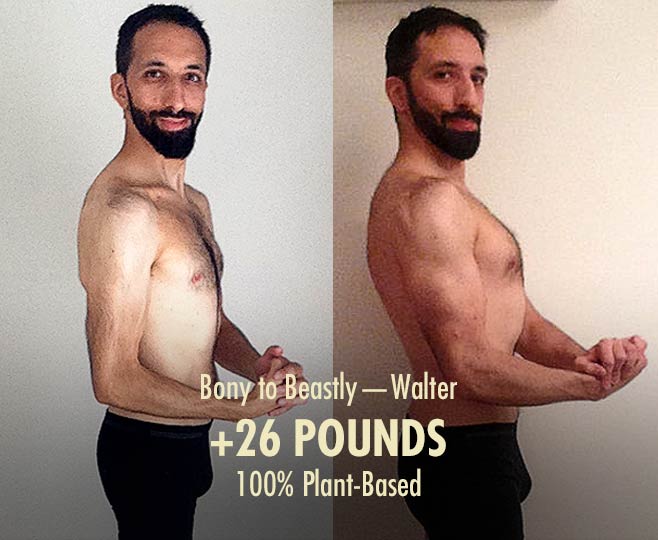
You can build muscle just fine while eating a vegan diet. Eating nine times a day can work. If you find that your lifestyle or moral code meshes well with a certain doctrine, great—you can probably make it work wonders for you. Most diet fads do work, at least in part. But probably not for the reason you think they do.
Whether you eat three meals a day or twelve, you’ll get comparable results if the foods you’re eating are the same. Plant-based pea protein blends are an awesome source of protein, but so is steak. There are many valid ways to get in the macronutrients you need to accomplish your goals.
Superfoods ARE Healthy—But There’s a Catch
Blueberries are fiercely rich in antioxidants and polyphenols, broccoli has fat and toxin-fighting properties, flax is a great source of polyunsaturated fats, and turmeric has incredible anti-inflammatory properties. If you love these foods, fantastic—devour them with reckless abandon. They taste delicious, and the benefits are real, so there’s little downside to enjoying them.
Blueberries rock, but so do apples and oranges—everyday Clark Kent foods. Chick peas are great, but so are yams. Don’t place too much emphasis on superfoods or super supplements. That’s not how a superhuman body is built. Chances are they won’t produce a noticeable difference in your results unless you figure out a great overall approach to eating.
Consider this study, where blueberries are being examined for their superfood-like phytochemical and antioxidant levels. The premise is that blueberries might be able to improve strength training recovery times, thus allowing you to build muscle more quickly. One group of study participants was given 2.2 pounds of blueberries between workouts, while the control group was given 2.2 pounds of regular fruits. Both were in the form of fruit smoothies, and neither group knew which type of smoothie they were drinking. The result? Eating 2.2 pounds of Blueberries slightly improved muscle recovery versus the control group.
Now check out this study, where participants started strength training and eating at a calorie surplus. The first group, who didn’t alter their diets at all, gained 3 pounds of muscle in 8 weeks just from the strength training. Pretty good. The second group, who consumed an extra 356g carbs and 106g protein powder, gained over 6 pounds of lean mass. More than double the muscle gains! The third group, who consumed an extra 438g carbs and just 24g protein powder, gained 7.5 pounds of lean mass!
These weren’t fancy carbs—just simple sugar and starch powders. A potato, fruit or bagel would have had the same effect. Interestingly enough, eating more bananas and potatoes, it seems, results in more muscle gains than even consuming protein powders.
The moral of the story? Superfoods can make the tiniest of differences, so if you’re looking to gain 1.1 pounds of muscle instead of 1 pound of muscle this week, go for it. How do you double your gains? Eat large amounts of staple foods. (Easier said than done, I know.) The problem is that people fall hook, line, and sinker for supplement ads and novel diets when the simple truth is that a good workout program and a healthy bulking diet are where the real results are built.
The Anti-Diet for Ectomorphs
If you’re trying to bulk up, build muscle, gain strength, and improve your health, that’s probably going to require that you lift weights and change your diet. And when it comes to your diet, I’m not saying that you shouldn’t learn about nutrition. In fact, you absolutely should.
If you don’t have the physique that you want, obviously, some things need to change. If you’re a naturally skinny guy like me, then you might even need to change your lifestyle quite a bit. What I’m saying is that you don’t need to adopt any kind of extreme diet.
We help our members build a bulking diet that suits their preferences, lifestyle, and budget. Our members in Texas are eating quite differently from our members in Latin America, who eat a very different diet from our members in India. And that’s okay. You can bulk up on a wide variety of foods. If you’re reading this from halfway across the world, rest assured that your local foods will be perfectly fine for bulking up. You don’t need to import your foods from Los Angeles because some fitness blogger there is in love with grass-fed beef or whatever the new fad is.
A good ectomorph bulking “diet” should be built around the foods that you enjoy. Within reason, of course. We can’t build your muscles entirely out of McDonalds and Pop-Tarts, no. But we can build them out of hamburgers and chicken parmesan. You may want to eat a side of green beans with your burgers to make your diet a bit more balanced, but there’s no need to eat a restrictive diet.
Skinny guys trying to build muscle and gain weight are the last guys who should be restricting foods for no reason. All this restrictive stuff is really more so for people trying to avoid foods that are easy to overeat. We’re trying to overeat, and we’re intentionally consuming a lot of calories. We’ve got a lot of room in our diets for the things that we love, even if they aren’t technically “clean” foods.
Even dessert can help. When it comes to eating enough food to build impressive amount of muscle, us skinny guys often struggle. That’s one of our biggest struggles. It’s a complicated issue, too. There are a lot of reasons why it’s so hard for ectomorphs to gain weight. Processed foods and desserts offer us an easy way to get more calories in. So long as we’re also getting the nutrients that we need to be healthy and build muscle from other foods, well, a dessert will surely help us hit our calorie goals.
We aren’t taking a casual approach to our bulking diets because we don’t care about results. Rest assured, our goal is to help you build muscle as quickly as humanly possible. We use this approach because this how you get results.
I’ve always had a love-hate relationship with superfoods and supplements. It’s fascinating, but it becomes so easy to forget the bigger picture. You can stock your cupboard full of normal foods that rival the best muscle-building supplements and superfoods on the market.
Tips for Bulking on an Anti-Diet
A good rule of thumb is to get around 80% of your calories from whole foods. When it comes to choosing which whole foods to eat, choose a wide variety of foods you actually want to eat. Try to include some foods from every food group. Try to find good sources of protein, carbs, healthy fats, fibre, and micronutrients.
- Put less emphasis on eliminating junk food and more emphasis on adding more nutritious foods. The best way to build muscle is to eat a wide, varied, and plentiful diet. This gives us a greater breadth of nutrients.
- Eat a diet that helps you to eat more calories. Most diets are designed to help people eat fewer calories, so you may need to deviate quite a bit from them.
- Eat a balanced diet rich in protein, carbs, healthy fats, fibre, and micronutrients. Don’t put too much emphasis on protein. Carbs and fats are just as good for building muscle. Fibre and micronutrients are part of a nutritious diet that supports our hormones and digestive health.
- Eat plenty of carbohydrates, especially after working out. Potatoes, yams, rice, corn, beans, peas, bananas, and oats are all great for building muscle. This is anabolic fuel for us ectomorphs. They pack our muscles full of glycogen.
- Eat plenty of healthy fats, such as nuts, seeds, fish, olive oil, avocados, eggs, cheese, Greek yogurt, and kefir. Healthy fats are rich in fat-soluble vitamins and minerals, they help us regulate our hormones, and they give us the energy we need to grow.
- Eat irresponsibly large amounts of fruits and vegetables. Carrots, apples, pineapples, cherries, berries, oranges, sea cucumbers—whatever you want. If you’re having trouble eating enough calories to gain weight, blend your fruits and veggies into smoothies.
- Eat the right amount of food, but don’t stress about your meal schedule. As a general rule of thumb, naturally skinny guys tend to have an easier time bulking up when they eat smaller meals more often. Fewer huge meals, more snacks. But that’s entirely up to you.
- Supplements can help, but they’re the cherry on top of the cake, so treat them as such. Put the bulk of your bulking focus on regular foods.
- It’s probably okay to have a drink or two now and then. Unless, of course, you have an unhealthy relationship with alcohol. In that case, feel free to avoid it.
- Liquid calories tend to be easier on the appetite. Smoothies are an incredibly nutritious way to take advantage of that. If there are any holes in your diet, find the foods that plug them and blend them together.
- Base your diet around your personal preferences, tolerances, and convictions.
- Eat as many superfoods as you want. They’re nutritious.
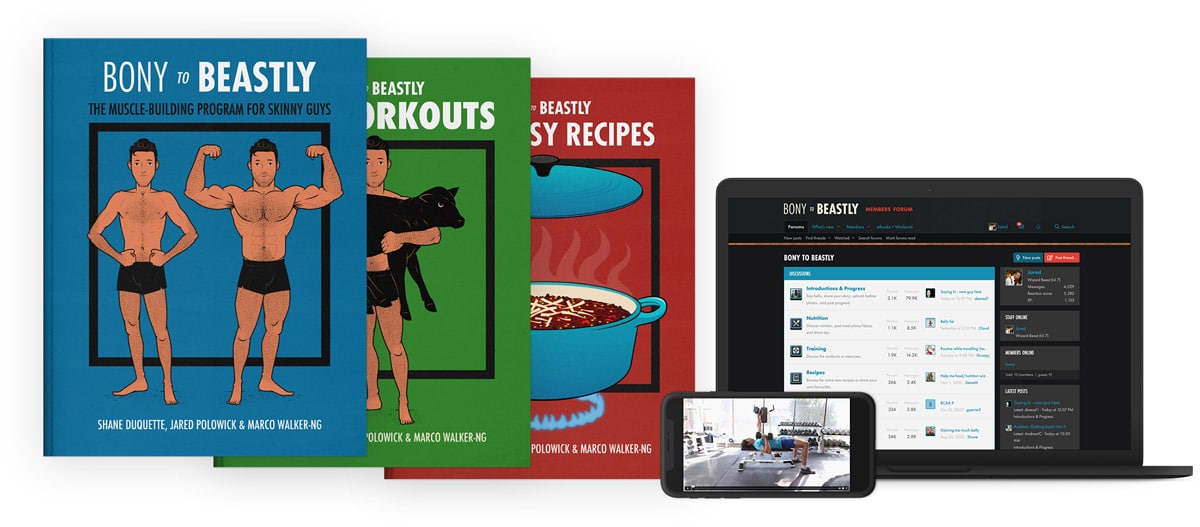
Alright, that’s it for now. If you want more muscle-building information, we have a free bulking newsletter for skinny guys. If you want our foundational bulking program, including a 5-month full-body workout routine, diet guide, recipe book, and online coaching, check out our Bony to Beastly Bulking Program. Or, if you want a customizable intermediate bulking program, check out our Outlift Program.
Shane Duquette is the founder of Outlift, Bony to Beastly, and Bony to Bombshell, each with millions of readers. He's a Certified Conditioning Coach (CCC), has gained 70 pounds, and has over a decade of experience helping more than 15,000 people build muscle. He also has a degree in fine arts, but those are inversely correlated with muscle growth.
